
On 27 February 1962, hundreds ofpeople crammed into Winchester Guildhall for a public meeting. It was, in many ways, not such an 0 unusual event: the foundation of a local committee, in this case the Winchester Excavations Committee. The meeting was, though, to have profound impacts, because it signalled, as The Times later said, the start of "one of the most important excavations worldwide of the 20th century" - nothing less than the beginnings of urban archaeology in Britain, and the recovery of a key to the pre-Conquest English past.
It had all begun - as some of the best archaeological stories do - with a rescue dig under a car park. At the turn of the 1960s, Trust Houses had announced plans to build a new hotel in the middle of Winchester, between High Street and the cathedral. Documentary evidence, brought together by the late Roger Quirk, indicated that this site was close to the location of the famous seventh-century Old Minster, and also of the New Minster founded by Edward the Elder to be a burial place for his father, Alfred the Great, and his dynasty. So the new development threatened the historic core of Winchester (Felix Urbs Wintonia: "the Fortunate City of Winchester"), England's first "capital" and the principal seat of the Anglo-Saxon kings of Wessex.
A test dig in 1961 revealed 3 metres of undisturbed strata of material going back to the Roman era, spanning the entire Old English period - and there were signs of major buildings.
この記事は BBC History UK の September 2022 版に掲載されています。
7 日間の Magzter GOLD 無料トライアルを開始して、何千もの厳選されたプレミアム ストーリー、9,000 以上の雑誌や新聞にアクセスしてください。
すでに購読者です ? サインイン
この記事は BBC History UK の September 2022 版に掲載されています。
7 日間の Magzter GOLD 無料トライアルを開始して、何千もの厳選されたプレミアム ストーリー、9,000 以上の雑誌や新聞にアクセスしてください。
すでに購読者です? サインイン

Viking mussels
ELEANOR BARNETT digs into archaeological research to recreate a Viking-cum-AngloSaxon seafood dish from medieval York
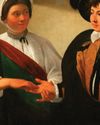
Fingers, frog's and fairies
Fortune telling was all the rage in the 16th and 17th centuries, and practitioners would stop at nothing to tap in to the supernatural. Martha McGill tells a story of Highland seers, tarot cards and encounters with the spirit world
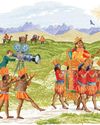
Nothing matches being with Alexander the Great on foot in the Hindu Kush
AT OUR LITTLE FILM COMPANY, MAYA VISION, we recently took the decision to digitise all of the rushes of our key films so that we could dispose of hundreds of boxes of tapes that had been kept in storage, throwing out stuff we thought we would never need again.

Library of the dead
Highgate Cemetery, created as a fashionable resting place for wealthy Victorian dead, is a veritable who's who of London's great and good. PETER ROSS roams the avenues of this most atmospheric necropolis
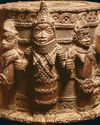
Slavery, exploitation and racism. These tragedies have long dominated histories of Africa. But there's another way to tell this story. And it's one that puts Africans right at the centre of their continent's extraordinarily rich and vibrant past
An 1414, in the Chinese city of Nanjing, a giraffe caused a stir. Amid a crowd of shocked, noble spectators, an official, leading the creature via a rope tied round its face, presented it to China's Yongle emperor. His officials said it was a qilin - an auspicious unicorn - which his sage governance had made appear.
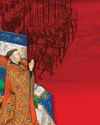
England's forgotten hero
When the Hundred Years' War was reaching a climax, one man was fighting tenaciously to secure the English claim to the French crown. So why, asks Joanna Arman, is Henry V's formidable brother, John, Duke of Bedford, not better known?
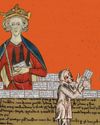
HENRY III AND THE MAGNA CARTA THAT MATTERED
King John's sealing of a charter at Runnymede in 1215 is one of the most feted moments of the Middle Ages. Yet, writes David Carpenter, it was the charter issued by his son 10 years later that became fundamental to England's history
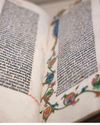
Gutenberg publishes a pioneering new book
‘The printing press triggers an information revolution
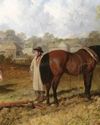
How empire ruptured rural Britain
We know that enslaved Africans and their descendants suffered in the distant colonies of empire. But, as Corinne Fowler explains, the colonial system also had dire impacts on people in the countryside of the 'motherland'
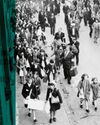
"I FELT VERY ALONE IN A WORLD GONE HORRIBLY MAD"
It was a moment of possibilities, dislocation and dread. Dan Todman tells the story of the 1.5 million urban Britons evacuated to the countryside at the start of the Second World War